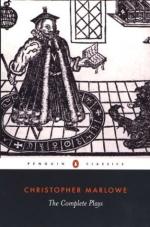|
This section contains 7,754 words (approx. 26 pages at 300 words per page) |

|
SOURCE: "The Seventeenth-Century Dutch Faust Play," in Husbanding the Golden Grain: Studies in Honor of Henry W. Nordmeyer, edited by Luanne T. Frank and Emery E. George, Department of Germanic Languages and Literatures, University of Michigan, 1973, pp. 238-54.
In the following essay, Pott discusses adaptations of the Faust legend in Dutch drama.
Holland's contribution to the Faust literature is a modest one. But with much of sixteenth-century Europe it shared an early interest and knowledge regarding the notorious doctor. For in the course of his wanderings Faust came also to the Low Countries. He even gained a kind of prominence there: he was imprisoned most probably in the castle Batenburg in the province of Gelderland as punishment for one of his typical escapades the nature of which is unknown.1
The Spies Faustbuch of 1587 elicited an almost immediate response in Holland. In 1592 appeared DE WARACHTIGHE HISTORIE VAN DOCTOR JOHANNES...
|
This section contains 7,754 words (approx. 26 pages at 300 words per page) |

|


